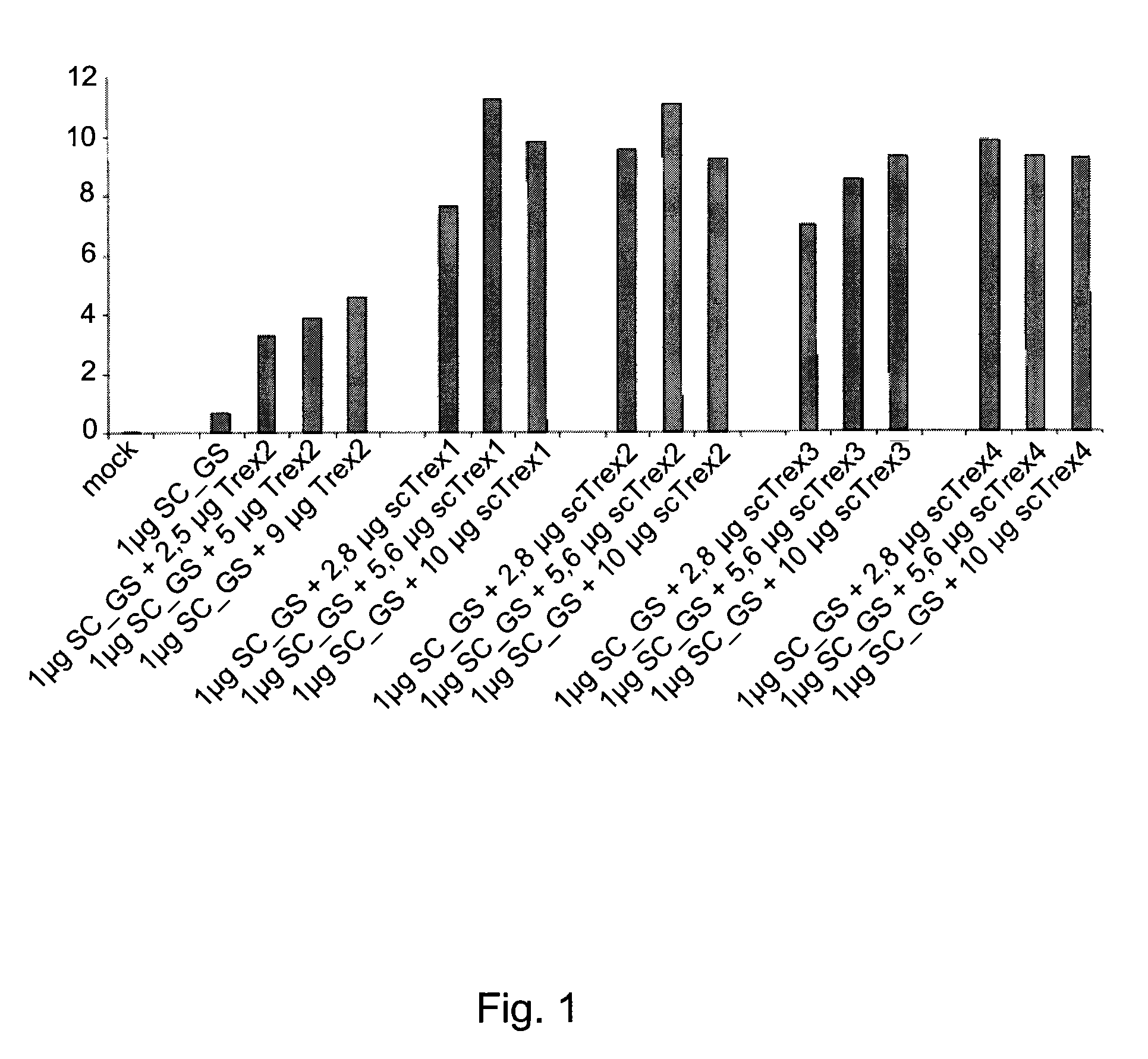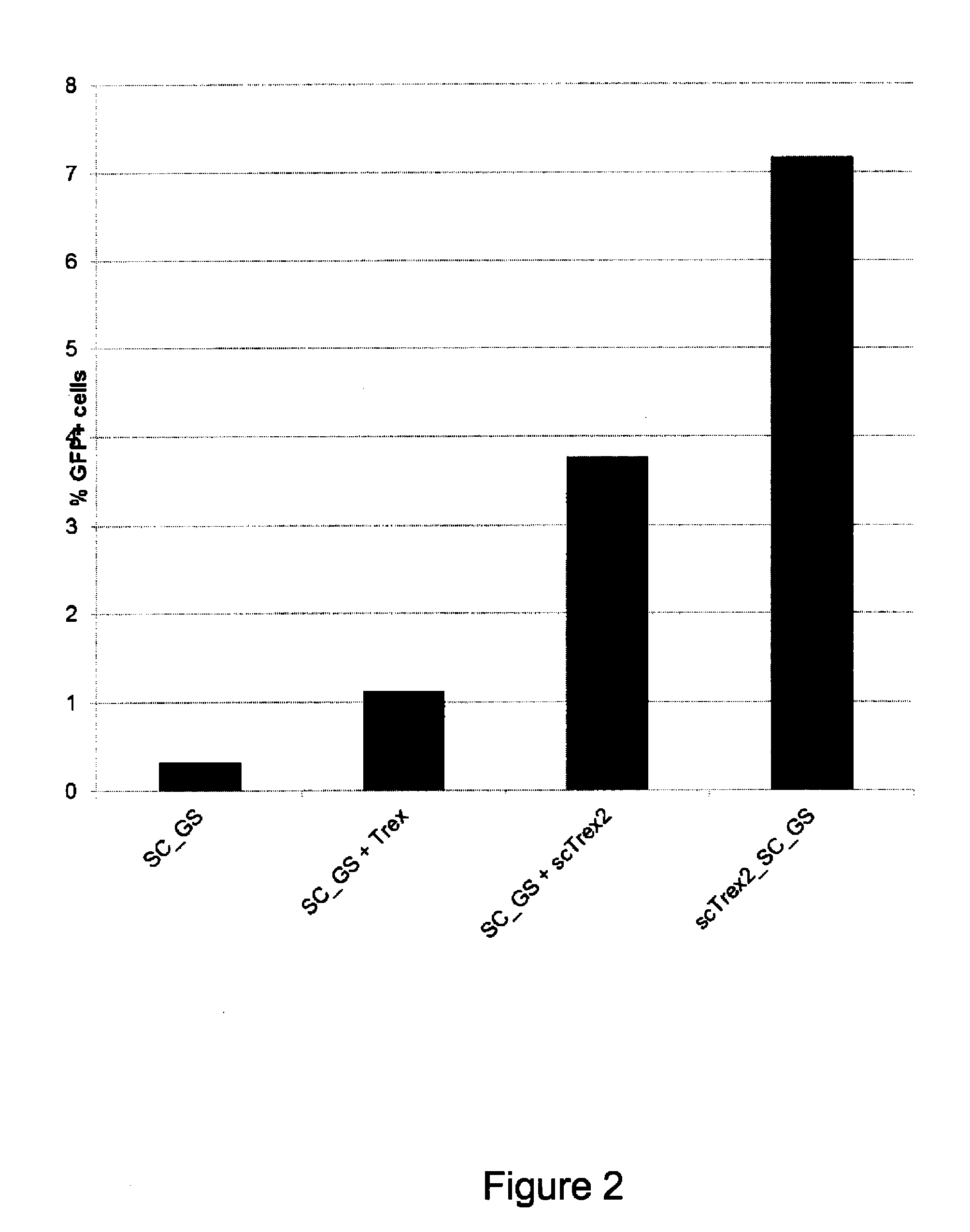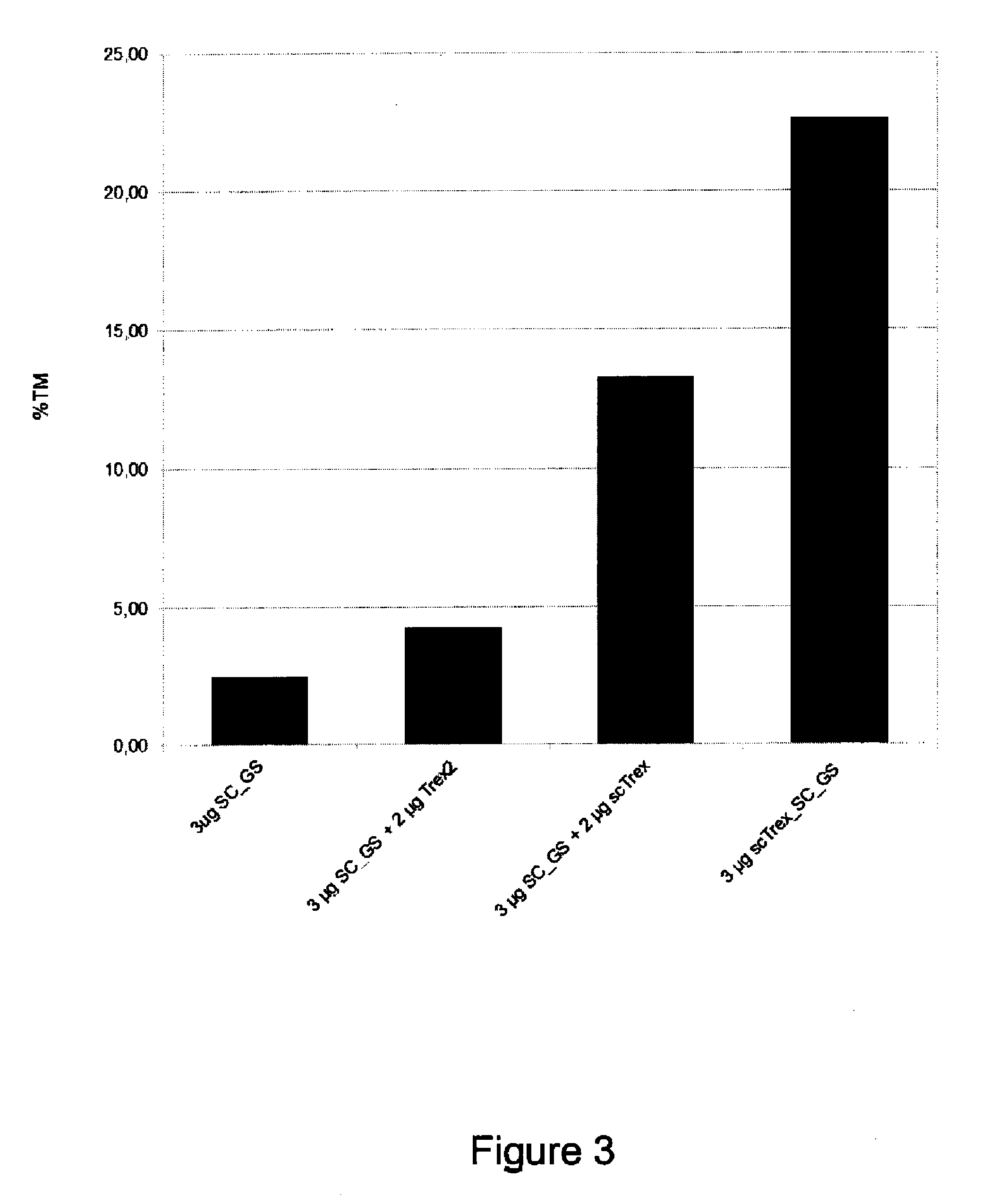Method for increasing the efficiency of double-strand-break induced mutagenesis
a double-strand break and mutagenesis technology, applied in the field of increasing the efficiency of double-strand break induced mutagenesis, can solve the problems of deleterious genomic rearrangements, cell cycle arrest, cell death, etc., and achieve the effect of increasing the frequency of nhej-based targeted mutagenesis
- Summary
- Abstract
- Description
- Claims
- Application Information
AI Technical Summary
Benefits of technology
Problems solved by technology
Method used
Image
Examples
example 1
Effect of Single-Chain TREX2 (scTrex) Molecules on the Meganuclease-Induced Mutagenesis
[0163]Human TREX2 protein (SEQ ID NO: 26) is known to function as a homodimer (Perrino, de Silva et al., 2008). We hypothesized that the creation of a TREX2 single-chain molecule can enhance the exonucleolytic activity. Four single-chain TREX2 molecules were designed and tested in co-expression experiments with an engineered meganuclease to evaluate their effect on meganuclease-induced mutagenesis. A set of four linkers (Link1 to Link4) consisting of 8, 11, 12 and 14 amino acids (SEQ ID NO: 1 to 4) were designed to create a bridge between the C-terminal alanine of one TREX2 molecule and the serine located at the N-terminus of the second TREX2 molecule of the homodimer. This creates a single-chain protein with a molecular weight of 53 kDa. Residues were chosen to create a flexible linker to tether the homodimer, without being restrictive. The four single-chain TREX2 (scTrex) molecular constructions...
example 2
Fusion of Single-Chain TREX2 Molecules to the N- or C-Terminus of an Engineered Meganuclease
[0173]Fusion of the TREX2 protein to an engineered meganuclease presents great advantages. First, it alleviates vectorization issues as it is much easier to transfect only one molecular species into the cells. Second, the fusion protein has the advantage to concentrate the TREX2 exonucleolytic activity at the double-strand break created by the meganuclease, minimizing potential adverse effects. Therefore, each of the four scTrex molecules (scTrex1 to scTrex4) are independently fused to the N- or C-terminus of the SC_GS meganuclease to evaluate the ability of these new chimeric rare-cutting endonucleases to increase targeted mutagenesis using the cell line previously described.
Material and Methods
[0174]a) Creating Fusion Proteins of SC_GS Meganuclease and Single-Chain TREX2 Molecules.
[0175]The strategy developed to build such fusion molecules is almost identical to the one described in the pre...
example 3
Impact of scTrex2 on Mutagenesis Induced by TALEN
[0189]Three heterodimeric TALENs called DMDT, HBBT and CAPT were designed to target the human genes DMD, HBB and CAPNS1 respectively. DMDT is encoded by plasmids pCLS9027 (SEQ ID NO: 61) and pCLS9028 (SEQ ID NO: 62), HBBT is an heterodimeric protein encoded by pCLS9235 (SEQ ID NO: 63) and pCLS9241 (SEQ ID NO: 64) and CAPT is encoded by pCLS9025 (SEQ ID NO: 65) and pCLS9026 (SEQ ID NO: 66). Proteins respectively encoded by these plasmids are given in SEQ ID NO: 85-90. DMDT is designed to cleave the target DNA sequences DMD_target: TGTATTCCTTTATGGATcagttaacattataaATGATAACTTTAGCTCA (SEQ ID NO: 67), HBBT is designed to cleave the target DNA sequence HBB_target: TCTGACACAACTGTGTTcactagcaacctcaaACAGACACCATGGTGCA (SEQ ID NO: 68), and CAPT is designed to cleave the target DNA sequence CAPT_target: TCCGGGAACCCAGAGCTcacagccacgatcttAGACCCGAGCCCACAGA (SEQ ID NO: 69).
[0190]Co-transfection of the DMDT, HBBT and CAPT expressing plasmids were perform...
PUM
| Property | Measurement | Unit |
|---|---|---|
| molecular weight | aaaaa | aaaaa |
| density | aaaaa | aaaaa |
| density | aaaaa | aaaaa |
Abstract
Description
Claims
Application Information
 Login to View More
Login to View More - R&D
- Intellectual Property
- Life Sciences
- Materials
- Tech Scout
- Unparalleled Data Quality
- Higher Quality Content
- 60% Fewer Hallucinations
Browse by: Latest US Patents, China's latest patents, Technical Efficacy Thesaurus, Application Domain, Technology Topic, Popular Technical Reports.
© 2025 PatSnap. All rights reserved.Legal|Privacy policy|Modern Slavery Act Transparency Statement|Sitemap|About US| Contact US: help@patsnap.com



